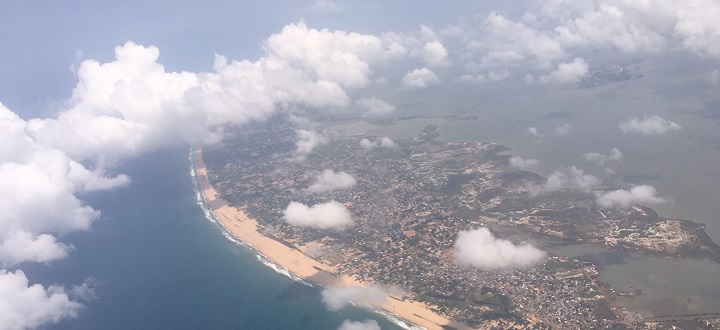Traffic fumes, industrial emissions and smoke from roadside rubbish fires and indoor cooking stoves are fuelling a growing air pollution problem over coastal cities in West Africa.
The extent of the problem is based on estimates because the air in most African cities goes largely unmonitored.
But the picture is about to get much clearer with the help of an international research collaboration involving scientists from York.
Specially-adapted planes
Atmospheric chemist Professor Mat Evans and a team of technicians, academics and PhD students from our Wolfson Atmospheric Chemistry Laboratories spent three weeks this summer flying over West Africa’s major coastal cities taking air quality readings from specially adapted planes.
They’ll spend the next few months crunching the data. The results will - for the first time - give a more accurate, and probably more serious insight into what’s going on in the haze above cities such as Accra, Abidjan, Lomé and Cotonou.
“The current estimates and models are based on the best available evidence, but they are estimates and none of us believe the actual readings we took in the summer will match the current official figures,” said Professor Evans.
“Our readings will provide an accurate evidence base. Once that baseline is established, we will take the figures and project five, ten and fifty years into the future looking at how different variables, like the area’s rapidly growing population, could have an impact on air quality.”
That information will help to shape funding decisions taken by governments and international development agencies.
Choices
“There are choices to be made,” says Professor Evans. “The population of West Africa is growing rapidly – decisions have to be taken, for instance, about how the country generates power and how it industrialises – should the region opt for a diesel or gas power stations, or should more resource go into solar power?
“One thing is certain, air quality can only get worse if the population of West Africa continues on the current path.”
The research is part of the £10 million Dynamics-Aerosol-Chemistry-Cloud Interactions in West Africa (DACCIWA) project. Led by the Karlsruhe Institute of Technology in Germany, the team includes scientists from France, Germany, Switzerland, Ghana, Nigeria, Benin and Ivory Coast. Over the next five years, the project will investigate the effects of air pollution on human health and the environment.
West Africa suffers from a toxic mix of indoor and outdoor pollution. There are often no regular rubbish collections, so local people have to get rid of waste in roadside fires; most cooking is done on smoky solid wood stoves and many homes are powered by small diesel generators. Outdated second hand cars belch out exhaust emissions.
Saharan sand
Saharan sand storms add to the problems by cloaking cities in choking dust while chemicals emitted by trees in Africa’s forest areas could magnify the effects of emissions from industrial and domestic sources. The sun is also driving harmful atmospheric chemical reactions.
The World Health Organisation calculates that poor air quality is responsible for more than 500,000 deaths a year in Africa.
Health crisis
As well as causing a growing health crisis, the researchers think that emissions could also be altering the climate along the coast of West Africa by changing the structure of clouds and monsoon rainfall patterns.
These climatic changes could have serious implications for agriculture and food production. “If people have no food because the climate is changing in their region then they will move. There are knock on effects,” says Professor Evans.
It’s a complicated problem – and tackling it could be a significant test for regional governments, says Professor Evans.
“In cities like London or Los Angeles, many of the problems are caused by emissions from cars, but you can tackle these by creating car free zones or electric cars. In West Africa the sources and the types of pollution are different so the solutions will also have to be different.
“The important point here is that our research will ensure any decisions taken in West Africa are taken from position of knowledge rather than a position of ignorance.”
The text of this article is licensed under a Creative Commons Licence. You're free to republish it, as long as you link back to this page and credit us.





